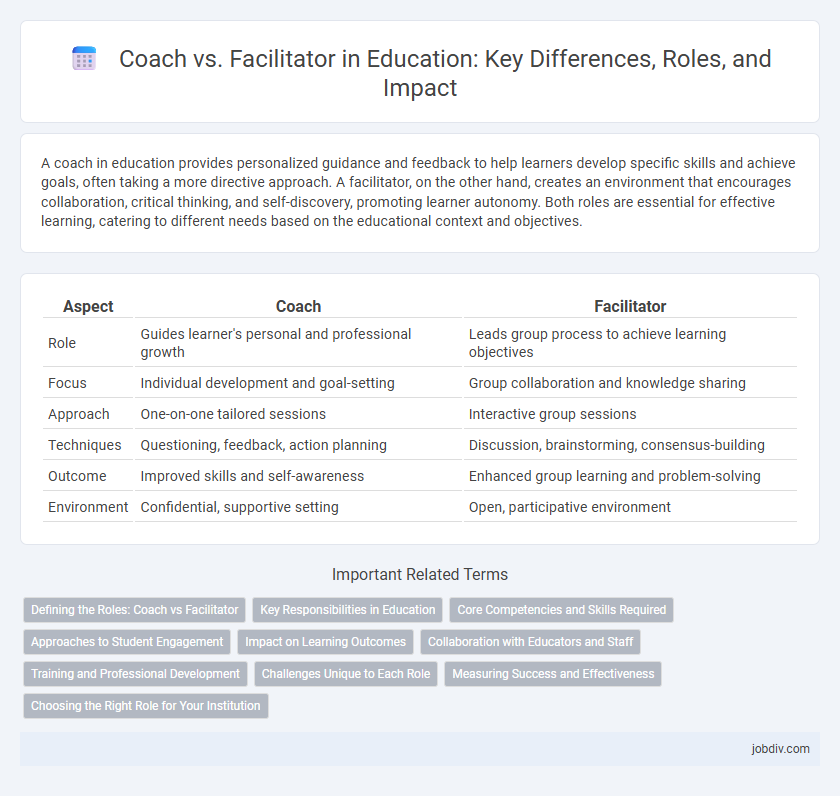A coach in education provides personalized guidance and feedback to help learners develop specific skills and achieve goals, often taking a more directive approach. A facilitator, on the other hand, creates an environment that encourages collaboration, critical thinking, and self-discovery, promoting learner autonomy. Both roles are essential for effective learning, catering to different needs based on the educational context and objectives.
Table of Comparison
| Aspect | Coach | Facilitator |
|---|---|---|
| Role | Guides learner's personal and professional growth | Leads group process to achieve learning objectives |
| Focus | Individual development and goal-setting | Group collaboration and knowledge sharing |
| Approach | One-on-one tailored sessions | Interactive group sessions |
| Techniques | Questioning, feedback, action planning | Discussion, brainstorming, consensus-building |
| Outcome | Improved skills and self-awareness | Enhanced group learning and problem-solving |
| Environment | Confidential, supportive setting | Open, participative environment |
Defining the Roles: Coach vs Facilitator
A coach primarily focuses on guiding individuals or teams toward personal and professional growth through personalized feedback and goal-setting, while a facilitator centers on managing group dynamics and fostering collaborative discussions to achieve collective objectives. Coaches employ techniques like active listening and questioning to unlock potential, whereas facilitators design structured processes that encourage participation and consensus-building. Both roles require strong communication skills but differ fundamentally in their approach to influencing outcomes within educational settings.
Key Responsibilities in Education
Coaches in education primarily focus on improving teacher performance through personalized feedback, goal-setting, and skill development to enhance instructional effectiveness. Facilitators guide collaborative learning environments, encouraging peer interaction, problem-solving, and reflective practice to support professional growth. Both roles aim to foster continuous improvement but differ in approach: coaches provide direct support and accountability, whereas facilitators promote shared learning and autonomy.
Core Competencies and Skills Required
Coaches in education emphasize goal-setting, active listening, and personalized feedback to foster individual growth and performance improvement. Facilitators prioritize group dynamics, collaborative problem-solving, and guiding discussions to enhance collective learning experiences. Core competencies for coaches include emotional intelligence and motivational skills, while facilitators require expertise in conflict resolution and consensus-building techniques.
Approaches to Student Engagement
Coaches elevate student engagement by providing personalized guidance, fostering goal-setting, and encouraging self-reflection to enhance individual learning outcomes. Facilitators prioritize collaborative learning environments, promoting peer interaction and critical thinking through open-ended discussions and problem-solving activities. Both approaches leverage active participation, but coaching emphasizes tailored support, while facilitation centers on communal knowledge construction.
Impact on Learning Outcomes
Coaches enhance learning outcomes by providing personalized guidance, fostering self-reflection, and encouraging goal-setting, which leads to deeper skill acquisition and motivation. Facilitators impact learning by creating collaborative environments that promote critical thinking, active participation, and peer-to-peer interaction, resulting in improved comprehension and retention. Both roles contribute uniquely to educational success through tailored support and interactive engagement strategies.
Collaboration with Educators and Staff
Coaches work closely with educators to provide targeted feedback and personalized professional development, enhancing teaching strategies and student outcomes. Facilitators guide collaborative sessions that promote shared decision-making, fostering a culture of continuous improvement among staff. Both roles prioritize effective communication and teamwork to support educational goals and improve school environments.
Training and Professional Development
Coaches in training focus on personalized skill development by providing targeted feedback and goal-setting strategies to enhance individual performance. Facilitators guide group learning experiences, fostering collaboration and active participation to maximize collective understanding and knowledge sharing. Both roles are essential in professional development, with coaches honing specific competencies and facilitators promoting interactive, learner-centered environments.
Challenges Unique to Each Role
Coaches face the challenge of tailoring personalized development plans that address individual learner needs while maintaining motivation and accountability. Facilitators must skillfully manage group dynamics, encouraging collaboration and equal participation to foster a productive learning environment. Both roles require adaptability, but coaches emphasize one-on-one guidance, whereas facilitators focus on creating inclusive, interactive educational experiences.
Measuring Success and Effectiveness
Measuring success for coaches often relies on individual performance metrics, goal attainment, and skill development tailored to the coachee's needs, whereas facilitators are evaluated based on group engagement, collaboration outcomes, and the effectiveness of the learning environment they create. Coaches use personalized feedback and progress tracking tools to assess long-term growth, while facilitators analyze participant interaction, session dynamics, and achievement of collective objectives. Both roles require distinct evaluation frameworks that highlight either personal transformation or group process effectiveness in educational settings.
Choosing the Right Role for Your Institution
Selecting the right role between a coach and a facilitator depends on the institution's goals and learning environment; coaches provide personalized guidance and skill development, ideal for one-on-one growth, while facilitators promote group engagement and collaborative learning in workshops or classrooms. Institutions aiming for targeted performance improvement benefit from coaching, whereas those focused on interactive discussions and collective problem-solving thrive under facilitation. Understanding these distinctions enhances instructional strategy effectiveness and maximizes educational outcomes.
Coach vs Facilitator Infographic

 jobdiv.com
jobdiv.com